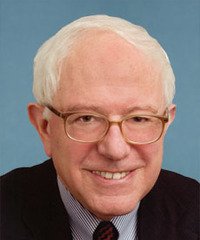
Bernie Sanders is serving his third term in the U.S. Senate after winning re-election in 2018. His previous 16 years in the House of Representatives make him the longest serving independent member of Congress in American history.
Born in 1941 in Brooklyn, Sanders attended James Madison High School, Brooklyn College and the University of Chicago. After graduating in 1964, he moved to Vermont. In 1981, he was elected (by 10 votes) to the first of four terms as mayor of Burlington. Sanders lectured at the John F. Kennedy School of Government at Harvard and at Hamilton College in upstate New York before his 1990 election as Vermont’s at-large member in Congress.
In an increasingly competitive global economy, we must ensure every student has the opportunity to pursue a quality education. Senator Sanders has worked hard to lessen the burden of tuition and student loans, implement the Every Student Succeeds Act (ESSA), and to create an innovative loan forgiveness program by which loans are forgiven for college graduates who work in public service – including nurses, teachers, and law enforcement officers.
Higher Education
For the first time in American history, the total amount of student loan debt now exceeds the amount of credit card debt, totaling more than a trillion dollars. More than two-thirds of college students who graduated in 2019 had outstanding loans, each owed an average of $28,950 in debt. In Vermont, 60 percent of college graduates have student debt, averaging $30,651.
In May 2015, Senator Sanders first introduced the College for All Act to address the crisis of college affordability. This legislation would provide at least $48 billion per year to states and tribes to eliminate undergraduate tuition and fees at public colleges, universities, and institutions of higher education controlled by tribes. Under this bill, students from any family would be able to attend a public four-year college or university, or four-year tribal college or university, tuition- and fee-free. All students, regardless of income, would also be able to attend community colleges, trade schools, or apprenticeship programs tuition- and fee-free.
Senator Sanders has also worked to expand Pell Grants and was an original co-sponsor and key supporter of the Post 9/11 GI Bill, which authorized the most significant expansion of Veterans’ education benefits in more than 50 years. He has advocated for “dual enrollment” programs, which allow high school students to take college courses that count toward both high school and college graduation requirements. Dual enrollment programs are especially beneficial for low-income and first-generation college students, as they introduce participants to college and encourage successful academic careers.
In an increasingly competitive global economy, we must ensure every student has the opportunity to pursue a quality education. Senator Sanders has worked hard to lessen the burden of tuition and student loans, implement the Every Student Succeeds Act (ESSA), and to create an innovative loan forgiveness program by which loans are forgiven for college graduates who work in public service – including nurses, teachers, and law enforcement officers.
Higher Education
For the first time in American history, the total amount of student loan debt now exceeds the amount of credit card debt, totaling more than a trillion dollars. More than two-thirds of college students who graduated in 2019 had outstanding loans, each owed an average of $28,950 in debt. In Vermont, 60 percent of college graduates have student debt, averaging $30,651.
In May 2015, Senator Sanders first introduced the College for All Act to address the crisis of college affordability. This legislation would provide at least $48 billion per year to states and tribes to eliminate undergraduate tuition and fees at public colleges, universities, and institutions of higher education controlled by tribes. Under this bill, students from any family would be able to attend a public four-year college or university, or four-year tribal college or university, tuition- and fee-free. All students, regardless of income, would also be able to attend community colleges, trade schools, or apprenticeship programs tuition- and fee-free.
Senator Sanders has also worked to expand Pell Grants and was an original co-sponsor and key supporter of the Post 9/11 GI Bill, which authorized the most significant expansion of Veterans’ education benefits in more than 50 years. He has advocated for “dual enrollment” programs, which allow high school students to take college courses that count toward both high school and college graduation requirements. Dual enrollment programs are especially beneficial for low-income and first-generation college students, as they introduce participants to college and encourage successful academic careers.